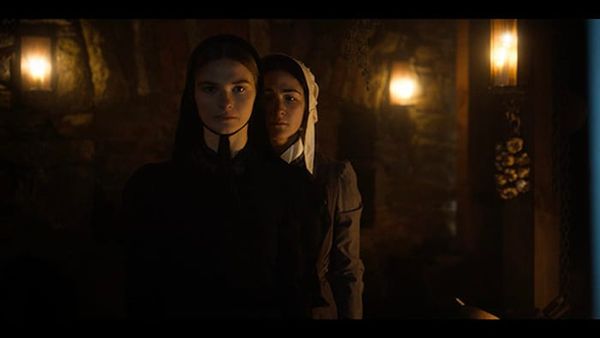Eye For Film >> Movies >> The Last Thing Mary Saw (2021) Film Review
The Last Thing Mary Saw
Reviewed by: Jennie Kermode

When we look back at the past we are often reminded that we need to appreciate the different perspectives people would have had then, but important though that is, it can be misleading. All too often it causes us to distance ourselves emotionally from those people, to think of them as other, and to associate them with particular sets of conservative values when the truth is that people varied in their thinking at all points in history. Set in a small New York town in 1843, The Last Thing Mary Saw, which premiered at this year’s Fantasia International Film Festival, tells the story of a young woman whose intense feelings for her housemaid cause her to doubt the truth of the strict Christian doctrines under which she has been raised, and to uncover different philosophies even within her own household.
It begins with Mary (Stefanie Scott) telling her story to a judge. She’s bound and blindfolded but officers are still hesitant to leave her alone with him, clearly assigning some supernatural agency to her. From this troubling spectacle we move back in time to the large, airy country house where she lives as a young lady – not as advantaged, perhaps, as her European counterparts, but comfortable nonetheless. She has just one problem and that’s the prevailing attitude to her sexuality. Her father is anxious to change her behaviour. The maid, Eleanor (Isabelle Fuhrman) is forced to endure a series of punishments such as kneeling on rice overnight, and there is talk of sending her away, yet the pair persist in spending time alone together whenever they can. This time is used not just for love but for the sharing of dangerous ideas.
Life as a servant was dangerous enough in this period, regardless of one’s sexuality, as we are reminded halfway through when a mysterious visitor (brilliantly played by Rory Culkin) confronts her in the kitchen. The disturbing events that follow change the balance of a narrative which hinges on power, how it is understood, where it lies, and the consequences of wielding it. Edoardo Vitaletti packs his frames with detail, even when the decoration is relatively sparse. The texture of a piece of bread, the gleam of light across a fat black seed pod, the bruised leather cover of a forbidden book. At dinner, family members hold their bodies stiff as if to blend in with the furniture. Elijah Rayman, playing Mary’s young cousin, has an extraordinarily serious face.
From those brightly lit initial scenes (the prologue notwithstanding), we journey through a series of darker spaces. Lighting them as if with candles or fires creates an arc of shadow across the top of the screen which mimics the appearance of early cinema and reminds us, constantly, that there are elements at play beyond those we can see. Judith Roberts (who could also be found at Fantasia in Giving Birth To A Butterfly) conjures up a fearsome presence as the frosty family matriarch. Mary and Eleanor are slight things in this fearful space, but a different kind of magic shimmers between them like a candle flame, prompting Mary to find something new and dangerous within herself.
Though it’s sometimes too predictable, this is a bold and atmospheric first feature which boasts some genuinely chilling moments. How well it works for you will depend in part on what you choose to see.
The Last Thing Mary Saw is now available on Shudder.
Reviewed on: 16 Aug 2021
















